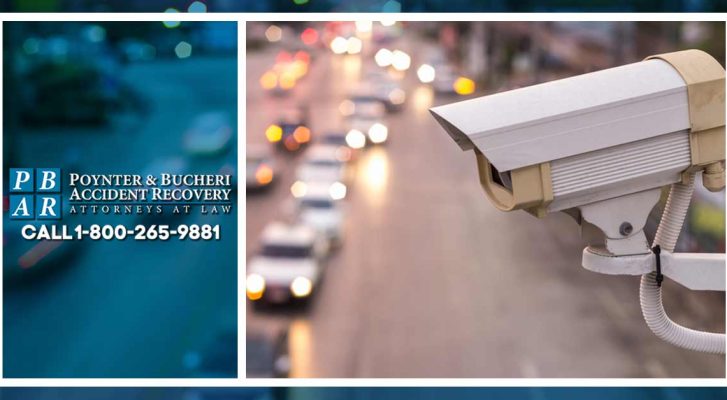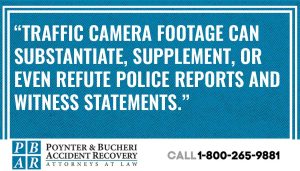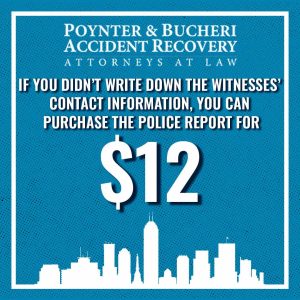
How to Access Traffic Camera Footage After Your Accident

When you’re in a motor vehicle accident, it can be challenging to prove who is at-fault. Each person may have a different opinion and details can be hard to pin down. You may be wondering how to access traffic camera footage. The good news is the city has many cameras that capture footage across Indianapolis’ roads, including traffic cameras, dashboard cameras, and security cameras.
Other cameras may be present, depending on the location of your car crash and may fall under local laws regarding public records. Video resources can be highly valuable for proving car accident and personal injury claims because they record traffic accidents as they happen, providing almost indisputable evidence.
It’s nearly impossible to figure out how to access traffic camera footage without the assistance of an Indianapolis car accident attorney.
Even when the videos are public records and mentioned in the police report, requests to gain access are often denied or ignored.
In this blog, we discuss the process of obtaining video, how they can help your case, common types of videos you can take to court, types of videos, and how to gain access to all recordings from the location of your accident (including public records).
How to Access Traffic Camera Footage in Indiana
There are a number of traffic cameras across Indiana, but they can sometimes be difficult to spot. Even if you didn’t notice a traffic camera at your location at the time of your car wreck, one may have still captured your accident. The most common location for traffic cameras in Indiana include toll stations, bridges, a red light, ramps, and intersections.
If a traffic camera recorded your wreck, act fast to obtain a copy quickly. Whoever owns the camera will likely delete their recordings shortly after the date it was created.
The first step in obtaining traffic camera footage is finding out who owns the traffic footage. This could be a local police department, county office, toll authorities, Indiana state police agency, the Indiana Department of Transportation, or another state or federal agency.
Once you learn who owns the footage, you can file a request to obtain the video(s). Depending on who owns the footage, you’ll likely need to fill out specific agency forms.
These forms are often confusing to most people and make it challenging to obtain traffic camera footage to prove your account of what happened. Additionally, not all agencies are obligated to provide a copy and will likely deny your request.
Enlist the help of an attorney at the earliest date possible. They can investigate who owns the footage and subpoena it.
Privately Owned Security Camera Footage
Many private residences and businesses have security cameras, and your wreck could have been captured on one of these private traffic cameras.

If you believe that a private security camera recorded your accident, you need to find out who owns the recorded footage and contact them directly. Fortunately, a private residence or business is more likely to provide it when you request it than a government agency, but these private owners are under no obligation to meet your request.
If you have difficulty discovering who owns the footage or if your written request is denied, you need to contact a car accident attorney to assist you. Like with government-owned footage, a car accident lawyer can subpoena video evidence from a private home or business.
If a judge grants the subpoena, it becomes a request backed by law and the private residence or business will be obligated to provide whatever evidence they have.
Using Dashboard Camera Footage
Police officers have used dashboard cameras for decades, but now the devices are becoming far more common for the general public. A police officer may review their footage when completing a police report and the police department is required to provide a copy for certain requests.
An experienced personal injury attorney helping you access the videos is well worth the cost.
If you had a dashcam running at the time of your car accident, report it to the police, insurance company, and your attorney so it can help prove your claim. Generally, the other driver’s insurance will want this in addition to trying to obtain traffic camera video from other sources.
Your attorney will compare your recording to the police report. Additionally, another driver could have recorded the incident on a dashcam.
Unfortunately, there’s usually no way of knowing if another driver recorded the incident unless they stopped after the wreck.
If you wrote down the name and contact information of any witnesses to report the accident, you can reach out to them to see if they recorded the wreck.
Your attorney will make sure the other driver’s video was mentioned on the police report and request copies of it be sent to their office.

If you didn’t write down the witnesses’ contact information, you may still be able to track them down.
Police reports sometimes include eyewitnesses’ names and contact information. Fortunately, you can purchase the police report for $12. You’ll need to know the date and location of the accident to access the police report.
Finally, if first responders arrived at the crash, they may have dashcams or body cams that you can use as evidence. Obviously, this footage didn’t record the accident itself, but the footage can be useful in proving that you sustained damages, including vehicle damages and personal injuries.
Types of Video Footage the Police May Provide
Red-light cameras, primarily designed to capture license plates of vehicles running red lights at an intersection, may not be a direct source of accident evidence. However, there are instances where these red light cameras inadvertently capture crucial scenes of accidents, making them potentially valuable in supporting a case.
Similarly, speed cameras focus on capturing the license plates of speeding drivers, aligning with their primary purpose of enforcing speed limits. They typically turn on to record a short clip when a driver goes faster than a pre-set threshold.
While their utility in recording accidents is limited, this type of traffic camera footage becomes relevant when the other party involved was speeding.
Police body cameras, on the other hand, serve as a direct and purposeful means of documenting post-accident scenes. These cameras are typically activated when police officers arrive at the scene, recording not only the immediate aftermath of the accident but also statements from involved parties, the extent of vehicle damage, and any visible injuries.
This footage can be invaluable in reconstructing the events leading up to and following the accident, offering a comprehensive visual record for insurance investigations or legal proceedings.
The objective nature of police body camera footage adds an element of credibility to the documentation, making it a reliable source of evidence in the assessment of fault and damages.
You can typically obtain traffic camera video footage at your local police department or transportation department.
What Can Traffic Camera Video Footage Prove?
While it can be challenging figuring out how to access traffic camera footage for your car accident, it’s worth the extra effort. This record can substantiate, supplement, or even refute police reports and witness statements. An experienced attorney uses the additional information to strengthen your car accident case and identify responsible party.
Other Ways Traffic Camera Footage and Public Records Can Be Used As A Resource
Timeline of Events: The video footage establishes a precise chronological sequence of actions leading up to the collision, providing a detailed account of the events that transpired. It captures the exact moment of impact, offering a valuable resource for determining the sequence of actions and fault
Behavioral Insights: By revealing traffic signals, speed compliance, and driving patterns, the footage offers insights into the behavioral of all drivers This comprehensive understanding contributes significantly to the interpretation of the dynamics of the accident and helps identify contributing factors that may have led to the collision.
Environmental Conditions: The video documentation goes beyond the vehicles involved, capturing environmental conditions such as weather, road obstructions, and visibility issues. This additional layer of information provides context about the wreck.
Quantitative Data: The traffic footage visually offers quantitative data on vehicle speed and force. This helps assess impact’s severity and providing crucial insights into injuries sustained during the accident.
Accident Reconstruction: To specialized professionals, traffic camera footage is a valuable tool for accident reconstruction They use it to create simulations or models of complex scenarios, contributing to a more accurate interpretation of how the accident unfolded.
Law Enforcement Documentation: The traffic camera video footage is a reliable documentation tool for law enforcement. It supports the creation of accurate police reports that align seamlessly with the visual evidence, reducing discrepancies and enhancing the overall reliability of the investigative process.
Legal Proceedings: In legal proceedings, the video evidence expedites the resolution of disputes by providing a clear, visual account of the car accident. This visual evidence supports informed decision-making for insurance companies and legal representatives, providing more efficient claims processing and dispute resolution.
Transparent Claims Process: By offering a clear visual record of the events, the video footage makes it clear what an insurance company is responsible for in your auto accident. Generally, the insurance company of the other driver will be reluctant to pay full compensation Providing as many details as possible can help you settle quickly, because the insurance company won’t want to lose in court.
Poynter & Bucheri- Indianapolis Personal Injury Lawyers
You want as much information as possible to prove your car crash case. A person may struggle to obtain traffic camera footage, police report and other video evidence.
You will have a far greater chance of gathering these resources by working with an experienced car accident attorney. We know how to access traffic camera footage in Indiana. Request a free consultation so we can investigate who may own the video evidence, and how we can subpoena evidence so that a government agency, private citizen, or business is compelled to provide the evidence.
If you were involved in a traffic accident in Indianapolis, contact the legal team at Poynter & Bucheri Accident Recovery Attorneys at Law. We’ll help you build your case and present it on your behalf so that you recover the compensation you deserve.
Depending on your case, you may be able to pay compensation for vehicle damages, medical bills, lost wages, loss of future earnings, pain and suffering, and more.
